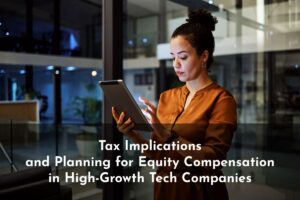In the complex world of equity compensation, understanding the intricacies of 83(b) elections is crucial. Whether you are the founder of a company or an employee in Silicon Valley’s vibrant startup scene, making informed decisions about 83(b) elections can significantly impact your financial future. In this article, we delve into some complex questions surrounding 83(b) elections, providing insights that could guide your next financial move.
First: What is an 83(b) Election?
Founders who are given restricted stock in their company can elect to be taxed on the value of the restricted stock at the date of grant rather than on the date that the stock grant vests by filing an 83(b) election with the Internal Revenue Service (IRS) informing the IRS that he/she would like to be taxed on their equity income on the date that the restricted stock is granted rather than on the date that the stock vests. This can be a tax-saving strategy if the stock price is expected to increase over time.
Stock option grants given to employees often include a vesting schedule, implying that the right to exercise the option and gain ownership of the stock occurs over a specified period of time. Sometimes companies give the employees the right to exercise the stock options early, before the specified vesting dates occur. This can be a valuable benefit for the holder of the stock option if there is an expectation that the value of the stock will appreciate over time.
An employee who exercises stock options has to recognize as income the difference between the fair market value of the stock on the exercise date and the exercise price of the stock. The income is classified as either ordinary income or as preference income for Alternative Minimum Tax (AMT) depending on the type of stock option that the employee holds. In companies with an appreciating stock price, the income that is recognized is expected to be lower when stock options are exercised close to the date that they are granted. This is why the right to exercise a stock option early is considered valuable for income tax planning purposes. An 83(b) election allows an individual who chooses to exercise the stock options early to inform the IRS that they would like to be taxed on their equity income on the date that the option was early exercised rather than on the date that the stock option vests.
If an 83(b) election is filed, any appreciation of stock price after the grant date (for restricted stock) or after the early exercise date (for stock options) is treated as a capital gain when the stock is eventually sold. Capital gains realized from the sale of stock that have been held for more than one year are taxed at lower preferential tax rates than the tax rates that apply to ordinary income or AMT preference income.
Now that we’ve laid out the basics, let’s dig into several common questions:
1. Long-term Capital Gains and 83(b) Elections
How does an 83(b) election affect long-term capital gains tax, especially in a rapidly appreciating company?
The 83(b) election can dramatically influence your capital gains tax liability and may be particularly advantageous in scenarios where company stock values are expected to soar. Electing to pay taxes on the stock’s fair market value at the grant or early exercise date, as opposed to its potential higher value at vesting, can result in substantial tax savings. However, this strategy comes with the risk of the stock value decreasing, in which case you would have paid taxes on a higher value than the stock’s worth at sale.
2. Risks in Value Decrease Post 83(b) Election
What are the implications if a company’s stock value decreases after making an 83(b) election?
Choosing an 83(b) election involves the risk of pre-paying taxes on a stock value that may later decline. If this happens, you do not get a tax refund or adjustment, resulting in a loss if the stock’s worth diminishes. It’s important to carefully assess the company’s prospects and market trends before making this election.
SEE ALSO: Strategies for Optimizing Employee Stock Options
3. 83(b) Elections in Startups and Early-Stage Companies
Is the 83(b) election beneficial for employees in startups or early-stage companies?
For employees in startups or early-stage companies, an 83(b) election can be a shrewd financial strategy. Given the potential for significant stock value appreciation in such companies, paying taxes on the lower initial value can lead to major tax savings. However, this decision should be weighed against the high-risk nature of startup investments.
4. 83(b) Election and Alternative Minimum Tax
How does the 83(b) election interact with AMT considerations?
The 83(b) election can have important implications for Alternative Minimum Tax (AMT) calculations. The income recognized through this can increase your AMT liability for that year, potentially leading to a higher tax bill. This aspect is particularly crucial for higher-income earners and necessitates careful planning and consultation with tax professionals.
SEE ALSO: Could You Benefit from Exercising Your Stock Options Early?
5. Deadlines and Procedures for 83(b) Election
What are the key deadlines and procedural requirements for an 83(b) election?
Timing is everything in filing an 83(b) election. You have a 30-day window from the stock grant or option exercise date to file with the IRS. This process requires precise documentation and communication with your employer, as it affects tax reporting. Missing this deadline can lead to forfeiting the election’s benefits for those shares.
Could an 83(b) Election Be Right for You?
Making informed decisions about your equity compensation is critical. If you have questions about your personal circumstances, please reach out today to schedule a discovery call and learn more about how the Wade Financial Advisory team can serve you. We look forward to helping you understand the tax and financial planning nuances of your stock option grants.
Looking Ahead: Next Month’s Focus on Alternative Minimum Tax
As we’ve seen, the 83(b) election is a powerful tool in the hands of savvy founders and employees, but it also brings us to the doorstep of another complex topic: the Alternative Minimum Tax (AMT). In next month’s article, we will explore the intricacies of AMT, how it interacts with various financial decisions, and strategies to navigate its potential impacts on your taxes.
Stay tuned for a deep dive into AMT, where we’ll unravel its complexities and provide actionable insights to help you make more informed financial choices.
This communication contains the opinions of Wade Financial Advisory, Inc. about the securities, investments, and/or economic subjects discussed as of the date set forth herein. This communication is intended for information purposes only and does not recommend or solicit the purchase or sale of specific securities or investment services. Readers should not infer or assume that any securities, sectors, or markets described were or will be profitable or are appropriate to meet the objectives, situation, or needs of a particular individual or family, as the implementation of any financial strategy should only be made after consultation with your attorney, tax advisor, and investment advisor. All material presented is compiled from sources believed to be reliable, but accuracy or completeness cannot be guaranteed. PAST PERFORMANCE DOES NOT GUARANTEE FUTURE RESULTS. INVESTMENTS BEAR RISK INCLUDING THE POSSIBLE LOSS OF INVESTED PRINCIPAL.
Wade Financial Advisory, Inc. is an investment advisor registered with the Securities and Exchange Commission. Registration of an Investment Advisor does not imply any level of skill or training. A Copy of current Form ADV Part 2A is available upon request or at www.advisorinfo.sec.gov. Please contact Wad Financial Advisory, Inc. at (408)369-7399 with any questions.











